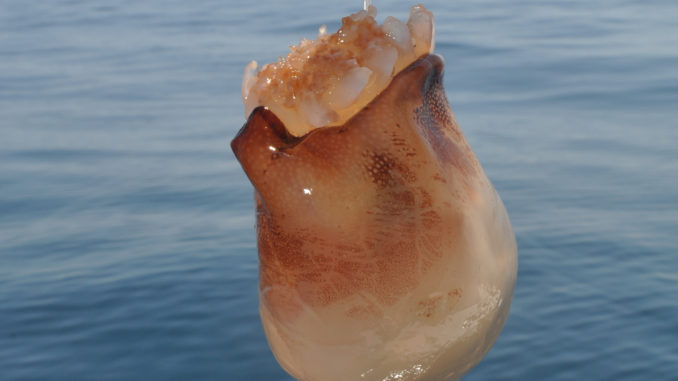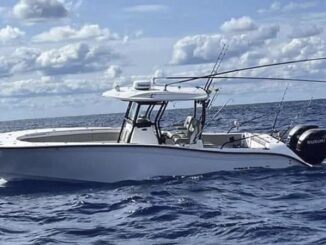
Cannonball jellyfish are common near Masonboro Inlet in hot weather. Any angler heading out for a day of amberjack fishing should look for them on the tide lines and catch a few in a landing net.
Trujillo threads one or two on 100-pound test mono and drops them down on a live-bait amberjack rod, using a 6-ounce bank sinker tied at the end to stop the jellyfish from sliding off and to help them sink.
“Sometimes I see them spinning on the surface,” he said. “If they are in the area, you can catch all you want in an hour. If they aren’t there, all you’ve lost is the time it takes to catch a few jellyfish.”
The jellyfish “teaser” is efficient in that Trujillo said only spadefish will eat it. He said pulling it all the way up revealed something that looked like an apple core.
“Even the monofilament line is chewed up,” he said. “But you can’t just drop down a piece of jellyfish mantle and expect them to hit it.”
Trujillo brings up the jellyfish teaser until it is just within sight. Then he ties a 1/0 live bait hook to a medium-weight spinning outfit and baits it with a strip of jellyfish mantle.
“You have to let the bait drift back down-current to the fish or they won’t eat it,” he said. “It seems odd that they will eat the jellyfish when you lower it down, but they won’t eat the bait until it is drifting past, presented naturally. If you need to get the bait down faster due to the current, all you have to do is add a split shot. That gives you better control over the presentation.”
When a spadefish hits, it circles round and round like a gigantic bluegill. Since they don’t dig for the structure like amberjack, spadefish bring some excellent light-tackle fun to a heavy-hitting amberjack adventure. Trujillo said an interesting thing about spadefish is that barracuda don’t eat them and barracuda are common at the artificial reefs in the summer months.
“If you were playing a Spanish mackerel, a barracuda would eat it in a flash,” he said. “Spadefish offer fast action if you have a kid along who isn’t up to duking it out with an amberjack.”





Be the first to comment